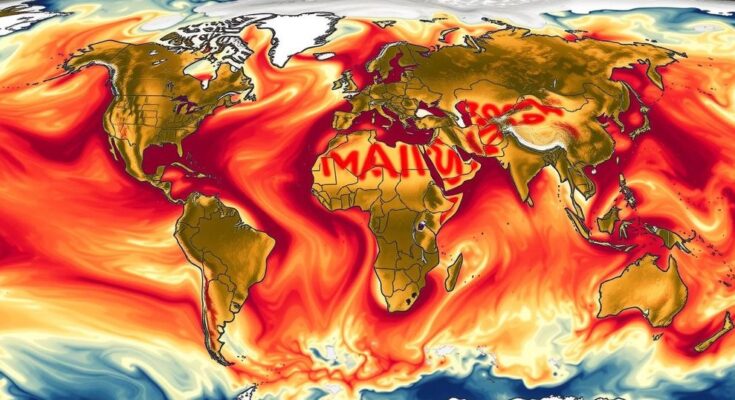In 2024, global temperatures rose dramatically due to climate change, resulting in an average of 41 additional days of dangerous heat. Extreme weather events linked to climate change caused over 3,700 deaths and massive displacements worldwide. Experts warn that without addressing greenhouse gas emissions, these severe weather patterns will continue to escalate. The necessity for immediate action to combat climate change is critical to safeguard vulnerable populations.
In 2024, climate change is estimated to have contributed to over 41 additional days of hazardous heat globally, according to scientists affiliated with World Weather Attribution and Climate Central. This unprecedented surge in temperatures has been linked to worsening weather events around the world, making 2024 potentially the hottest year on record. The scientific analysis indicates that human activities, particularly the burning of fossil fuels, have exacerbated extreme weather conditions, leading to increased heat, droughts, tropical cyclones, and significant rainfall worldwide.
The year 2024 experienced an extraordinary series of climate events, with regions such as Northern California and Death Valley facing extreme temperatures. Several nations, including those in Central America and West Africa, reported dangerously high heat levels that threatened vulnerable populations, especially children. Major tourist sites in southern Europe, like the Acropolis in Greece, were closed due to the intense heat, while countries in South and Southeast Asia had to close schools. The research team analyzed temperature data for 2024, comparing it to a hypothetical scenario without climate change, yielding concerning results.
Kristina Dahl from Climate Central indicated that the most impoverished nations are facing the severest impacts, highlighting that many heat-related fatalities remain underreported. This underreporting complicates efforts to raise awareness about the deadliness of heat waves. According to Friederike Otto, a climate scientist, the link between extreme weather events and climate change is alarming and demands immediate action to mitigate its effects.
The analysis of 29 significant weather-related disasters in 2024 revealed that 26 of these events had definitive connections to climate change, resulting in over 3,700 fatalities and massive displacement. While the El Niño weather pattern influenced some of the year’s conditions, the primary driver of these alarming trends is attributed to climate change. Experts warn that unless greenhouse gas emissions are curtailed effectively, extreme weather events will continue to escalate in frequency and severity.
The United Nations Environment Programme has also alerted that without concerted action, significantly more climate extremes will occur, as rising carbon dioxide levels have been recorded in the atmosphere this year. Nevertheless, there is hope; Julie Arrighi from the Red Cross Red Crescent Climate Centre emphasized that nations can mitigate these impacts through proactive measures and adaptive strategies tailored to their unique challenges.
In light of these findings, it becomes increasingly evident that the global community must prioritize climate change initiatives to prevent deadlier heat waves and further climatic extremes. Taking concrete steps is critical to ensuring a sustainable future for all.
The report outlines the profound effects of climate change on global temperatures and extreme weather patterns in 2024. It provides evidence of how human activities, particularly the reliance on fossil fuels, are accelerating climate-related disasters. The analysis underscores the disparity in vulnerability among different nations, particularly highlighting the plight of developing countries facing the harshest consequences. Furthermore, the connection between extreme weather events, rising temperatures, and human-induced climate change serves as a critical call to action for global stakeholders.
The analysis conducted by scientists highlights the alarming impact of climate change, leading to extreme heat and worsening weather conditions across the globe in 2024. As researchers establish clear links between climate change and numerous deadly weather events, the urgency for proactive climate initiatives has never been greater. Addressing this crisis through targeted actions and adaptive strategies is essential to mitigate further tragedies and secure a sustainable future.
Original Source: www.nationalobserver.com




